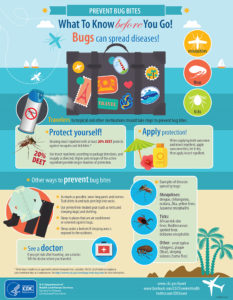An Ounce of Prevention is Worth More than a Pound of Cure
 In the coming weeks, Operation Medical is sending volunteers to both Haiti and Rwanda. Preparing and packing for travel to tropical and other destinations is much more than “what to wear?”. At Operation Medical we take the safety of our volunteers seriously including personal health and disease prevention.
In the coming weeks, Operation Medical is sending volunteers to both Haiti and Rwanda. Preparing and packing for travel to tropical and other destinations is much more than “what to wear?”. At Operation Medical we take the safety of our volunteers seriously including personal health and disease prevention.
Bugs (including mosquitoes, ticks, and some flies) can spread diseases (including Zika, dengue, and Lyme disease), many of which cannot be prevented or treated with a vaccine or medicine.
Reduce your risk by taking steps to prevent bites.
We urge all volunteers to seek advice from their personal physician, a travel clinic and/or the Centers for Disease Control and Prevention.
Zika
According to the Centers for Disease Control and Prevention, both Haiti and Rwanda visitors are at risk for Zika. Many people infected with Zika virus do not get sick or only have mild symptoms. However, infection during pregnancy can cause severe birth defects. Because there is no vaccine or medicine for Zika, travelers should take steps to prevent getting Zika during travel. The best prevention is the use of insect repellent. They should also take steps to prevent spreading it when they return home.
Yellow Fever
In addition to Zika, Rwanda reports the risk for Yellow fever. Yellow fever vaccine is the best protection against yellow fever disease. Travelers to areas with risk of yellow fever should also prevent mosquito bites by using insect repellent, wearing long-sleeved shirts and pants when outdoors, and sleeping in an air-conditioned or well-screened room or under an insecticide-treated bed net.
CDC Advice on Preventing Bug Bites:
What to know before you go. Bugs can spread diseases. Travelers to tropical and other destinations should take steps to prevent bug bites.
Protect yourself
· Wearing insect repellent with at least 20% DEET protects against mosquito and tick bites.
· Use insect repellents according to package directions and reapply as directed. Higher percentages of the active ingredient provide longer duration of protection.
· When applying both sunscreen and insect repellent, apply sunscreen first, let it dry, then apply insect repellent.
Other ways to prevent bug bites
- Wear long sleeves and pants.
- Use permethrin-treated gear and clothing.
- Sleep in places that are air conditioned or screened against bugs.
- Sleep under a bed net if sleeping area is exposed to the outdoors.
- Examples of diseases spread by bugs:
- Mosquitoes: dengue, chikungunya, malaria, Zika, yellow fever, Japanese encephalitis
- Ticks: African tick-bite fever, Mediterranean spotted fever, tickborne encephalitis
- Other: scrub typhus (chiggers), plague (fleas), sleeping sickness (tsetse flies)
See a doctor if you get sick after traveling and tell the doctor where you traveled.
For more information: call 800-CDC-INFO (232-4636) or visit www.cdc.gov/travel
Insect Repellent
Use EPA-registered insect repellents that contain at least 20% DEET (products include Cutter Backwoods and Off! Deep Woods) for protection against mosquitoes, ticks, and other bugs. Other repellents protect against mosquitoes but may not be effective against ticks or other bugs:
Picaridin (also known as KBR 3023, Bayrepel, and icaridin)
Oil of lemon eucalyptus (OLE) or para-menthane-diol (PMD)
IR3535
2-undecanone (methyl nonyl ketone)
Find the EPA-registered insect repellent that is right for you. The effectiveness of insect repellents that are not registered with the EPA, including some natural repellents, is not known. For more information, see EPA’s website.








